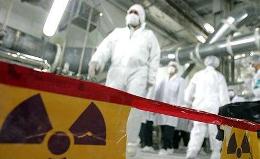 (Reuters) -�Iran�may be holding back from working with a U.N. investigation into its nuclear program to use it as a bargaining chip in pursuit of significant sanctions relief or other concessions in broader negotiations with world powers.
(Reuters) -�Iran�may be holding back from working with a U.N. investigation into its nuclear program to use it as a bargaining chip in pursuit of significant sanctions relief or other concessions in broader negotiations with world powers.That could explain why United Nations nuclear inspectors once again returned empty-handed after talks last week in Tehran, where they tried to overcome obstacles to a long-stalled inquiry into suspected atomic bomb research by�Iran.
Iran has suggested at various times in the past that it would expect a "kind of reward" for cooperating with the International Atomic Energy Agency (IAEA), a Western official said, making clear he saw no rationale for this.
If this is Tehran's thinking, a year-long effort by the IAEA to unblock its investigation looks unlikely to succeed as long as separate diplomacy between the six major powers and Tehran remains deadlocked.
"They don't want to offer substantive cooperation," one Western diplomat said after the IAEA's latest stab on January 16-17 at coaxing the Islamic Republic into starting to address questions about its atomic activities.
Another envoy in Vienna, where the U.N. agency is based, described the IAEA's roller-coaster negotiations with Iran as a "well-practiced dance" by Tehran of "two steps backwards, one step forward."
The failure to achieve a breakthrough in the most recent of a series of largely fruitless meetings between the IAEA and Iran marked another setback for diplomatic efforts to resolve the stand-off and head off the threat of a new Middle East war.
Both Iran and the United States, Britain, France, Germany,�China�and Russia say they want to resume talks after a seven-month hiatus. But the two sides' priorities diverge: the powers want to curb Iranian nuclear work of potential use in developing atomic weapons, while Iran wants sanctions scrapped and their "rights" to enrich uranium formally recognized.
They have yet to announce a date and venue and as delays continue, Iran is amassing more nuclear material that could be turned into bomb fuel if refined further. Israel has threatened military action to foil any nuclear weapons capability in Iran.
The powers, known as the P5+1 as they group the five permanent, veto-wielding members of the U.N. Security Council along with�Germany, want peaceful guarantees on Iran's enrichment program and Iranian transparency toward the IAEA.
Iran, which says it seeks only peaceful nuclear energy from enrichment, is keen above all for the West to remove sanctions expanded last year to block its economically vital oil exports.
"Tehran apparently is seeking to withhold cooperation with the IAEA in order to increase leverage vis-a-vis the P5+1," said Daryl Kimball of the Arms Control Association, a U.S.-based research and advocacy group.
NO REWARD
The IAEA, whose mandate is to forestall the spread of nuclear weapons, has been trying for a year to negotiate a framework agreement with Iran giving its inspectors access to sites, officials and documents for their investigation.
After the previous meeting in mid-December, the IAEA said progress had been made and that it expected to seal the deal in this month's session. But after the two days of talks last week it said "important differences" remained.
A new round of IAEA-Iran discussions has been scheduled for February 13, which may allow for the global powers and Tehran to meet first to try and make headway in the wider dispute.
"Iran might think that if it grants access now, it may be in a weaker position to demand sanctions relief in a few week's time," said Shashank Joshi, a senior fellow and Middle East specialist at the Royal United Services Institute.
But the Western official said he saw no willingness among the powers "to pay any kind of reward" to Iran if it allowed the IAEA to resume its inquiry: "We think that is separate and it is in Iran's own interest to cooperate with the IAEA."
The powers and Iran last met in June, when Tehran rejected demands to halt its higher-grade enrichment and close an underground nuclear plant in exchange for limited sanctions relief, such as an end to a ban on imports of aviation spare parts, as well as civilian nuclear cooperation.
"Iran has always linked the IAEA and the P5+1 talks," Cliff Kupchan at political risk consultancy Eurasia Group said.
"They don't like what's on offer from the Western nations in the main talks, so they're holding all their chits, including ones relevant to the IAEA, for the main talks."
Hossein Mousavian, a former Iranian nuclear negotiator, said Iran and the powers should agree in their next meeting a "package consisting of all major requirements" of both sides.
"This should include technical demands of the IAEA and also address Iranian demands for recognition of its rights for enrichment and lifting sanctions. If so, then the IAEA would be able to have a successful visit to Tehran," he said.
By Reuters
The Iran Project is not responsible for the content of quoted articles.










